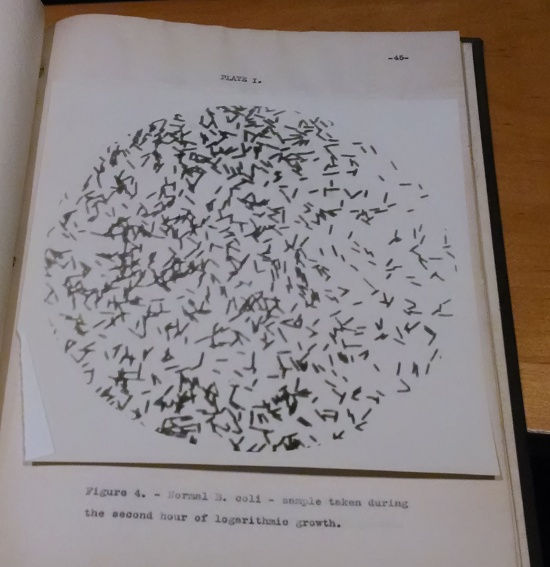A couple of days ago, John Scalzi posted a writing advice open thread, asking people to share the best advice they’d gotten on the craft of writing. There’s a lot of good stuff in there, much of it fairly specific to fiction writing– stuff about plotting, the use of synonyms for “said,” how to keep… Continue reading Work. Finish. Publish.
Category: History of Science
Old Thesis Club: A Specific Effect of X-Rays on Bacteria, by Thomas J. Dietz, 1934
Back in the fall, I did a bunch of write-ups of old Master’s theses that we found when clearing some space in a storage room. I got away from this because I was busy working on the book, but I have a few more that I pulled out to look at, and since all the… Continue reading Old Thesis Club: A Specific Effect of X-Rays on Bacteria, by Thomas J. Dietz, 1934
Reductionism Is Not Fundamentalism
Ashutosh Jogalekar has a response to my post from yesterday complaining about his earlier post on whether multiverses represent a philosophical crisis for physics. I suspect we actually disagree less than that back-and-forth makes it seem– he acknowledges my main point, which was that fundamental theoretical physics is a small subset of physics as a… Continue reading Reductionism Is Not Fundamentalism
Repeat After Me: Particle Physics Is Not All of Physics
The very last section of the book-in-progress (at least the draft that’s with my editor right now…) is titled “Science Is Never Over,” and talks about how there are a nearly infinite number of phenomena that you can investigate scientifically. The universe is a never-ending source of amazement and wonder, with surprisingly rich dynamics in… Continue reading Repeat After Me: Particle Physics Is Not All of Physics
Richard Feynman, Placebo Technoradical
This past Monday, a lot of people in my social media feeds were passing around this Benjamin Bratton piece about the problems with TED, blasting the whole phenomenon as “placebo technoradicalism.” The whole thing, he claims, is shallow pseudo-inspirational bullshit that makes people feel nice, but doesn’t actually lead anywhere. As he notes at the… Continue reading Richard Feynman, Placebo Technoradical
Eureka! Discovering Your Inner Scientist
I sent off the complete draft of the book-in-progress yesterday, somewhere between 12 and 36 hours ahead of my contractual deadline. Which I suppose makes it a book-in-process now, maybe. That process may still include re-writes, though, so my work probably isn’t done yet. The final draft, according to Word anyway, comes to 253 pages… Continue reading Eureka! Discovering Your Inner Scientist
Missing the Eureka Moment
Dmitrii Ivanovich Mendeleev hit on the idea of the Periodic Table as an organizing theme for a textbook he began writing in 1868. He did some work on refining the idea, and in 1870 presented a paper on it to a meeting of the Russian Chemical Society. Well, actually, that’s not quite true– Mendeleev did… Continue reading Missing the Eureka Moment
The Extensive Banality of Evil
We had a very late colloquium talk on Monday– on the next-to-last day of our fall term exam period, so student turnout was a little disappointing– by the science historian Dieter Hoffmann from the Max Planck Institute for the History of Science, who was in town visiting a colleague in our history department. He told… Continue reading The Extensive Banality of Evil
“Up to Their Tricks Again”: My New Favorite Physicist Story
From The Fly in the Cathedral, Brian Cathcart’s history of the experiments that led up to the splitting of lithium nuclei by accelerated protons in the Cavendish Laboratory in 1932. One of the incidents along the way was the discovery of the neutron by James Chadwick, also in 1932. In describing Chadwick, who was Ernest… Continue reading “Up to Their Tricks Again”: My New Favorite Physicist Story
“Eureka!” and the Problems Thereof
I’m not talking about the tv show Eureka here, which was mostly silly fluff but not especially problematic. I’m talking about the famous anecdote about Archimedes of Syracuse, who supposedly realized the principle that bears his name when slipping into a bath, distracted by a problem he had been assigned by his king. On realizing… Continue reading “Eureka!” and the Problems Thereof


